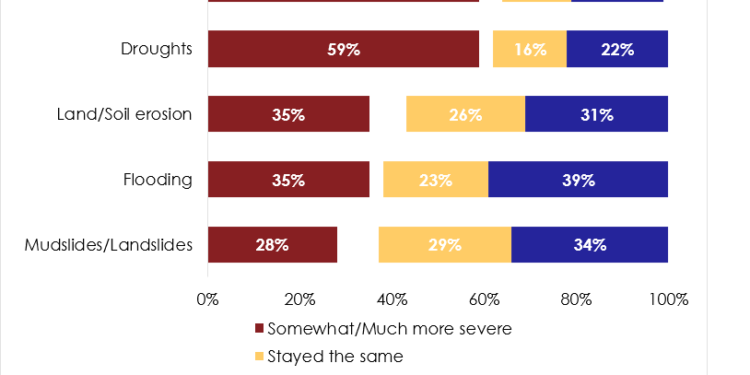- Food security, livelihoods, and economies are threatened as extreme weather conditions hit Africa hard.
- Citizens are now calling for bold action from their governments and the global community to combat this worsening crisis.
- Over 82% of Africans advocate for measures to protect communities against extreme floods, droughts, and environmental degradation.
As climate change tightens its grip, the African continent is bearing the brunt of extreme weather conditions that have profoundly impacted food security, livelihoods, and economies.
A recent Afrobarometer survey paints a stark picture of the hard reality for millions of Africans: worsening droughts and crop failures are threatening their very survival. Citizens are now calling for bold action from their governments and the international community to combat this worsening crisis.
A decade of declining agricultural yields
Over the past decade, the majority of Africans report an alarming increase in the severity of droughts and crop failures. According to Afrobarometer, 59 per cent of respondents across 22 countries say that these issues have become “somewhat more severe” or “much more severe.”
Farmers in the Sub-Saharan Africa region, an area already vulnerable to erratic rainfall, are experiencing even shorter growing seasons and diminished harvests.
The effects are not evenly distributed. While some countries such as Mauritius and Gabon report high levels of climate awareness, others such as Tunisia and Tanzania lag in recognizing the full extent of the threat.
This disparity highlights the urgent need for equitable access to climate education and resources to empower communities across the continent.
Who should shoulder the responsibility?
The question of accountability in addressing climate change is as complex as the crisis itself. When asked who should bear primary responsibility for mitigating its effects, a plurality of Africans (37 per cent) pointed to their own governments, underscoring the need for local leadership.
Wealthy nations, often criticized for their role in historical emissions, were cited by 26 per cent of respondents, underscoring a demand for global accountability.
Interestingly, 18 per cent of respondents believe that ordinary citizens must also play a role, reflecting a growing awareness of the importance of individual and community-driven initiatives.
This sentiment aligns with the broader call for collaboration among governments, international organizations, and local populations to address the climate emergency comprehensively.

Read also: COP29 Climate Deal Insfuccient, Developing Countries Decry
The economic toll of climate change
For agriculture-dependent nations such as Kenya, the economic consequences of climate change are becoming increasingly dire. Kakuzi PLC, a leading exporter of macadamia and avocado, issued a profit warning this week, attributing a projected 25 per cent earnings drop to lower crop yield and disrupted shipping routes.
Stories like Kakuzi’s exemplify how environmental challenges ripple through supply chains, from farms to global markets, affecting farmers, businesses, and consumers alike.
Smallholder farmers, who make up a significant portion of Africa’s agricultural workforce, are particularly vulnerable. Lacking the financial resources to invest in irrigation or climate-resilient crops, they often face devastating losses.
This vulnerability is compounded by land degradation, which reduces productivity and increases reliance on food imports.
Investing in climate resilience
The Afrobarometer survey reveals overwhelming public support for investment in climate-resilient infrastructure. A staggering 82 per cent of respondents advocate for measures to protect communities against extreme floods, droughts, and environmental degradation.
These investments could include building water storage facilities, developing drought-resistant crop varieties, and improving early warning systems for natural disasters.
Equally critical is the call for governments to pressure wealthy nations into providing the resources necessary to adapt to climate change. With 77 per cent of respondents supporting this demand, it is clear that many Africans see international cooperation as a cornerstone of climate resilience.

Read also: Climate change finance, accounting for “green wealth” top agenda for Africa as COP29 opens
Awareness and action
Despite the challenges, there is a silver lining: increasing awareness of climate change across the continent. Afrobarometer reports that 59 per cent of Africans have heard about climate change, and among them, 81 per cent recognize that it is making life worse.
This awareness is particularly pronounced in countries like Mauritius, Zimbabwe, and Zambia, where more than 90 per cent of respondents report negative impacts.
However, awareness alone is not enough. To translate knowledge into action, governments must prioritize climate change education, integrate sustainability into development plans, and provide platforms for citizen engagement.
Ordinary Africans, too, have a role to play by adopting sustainable practices and holding their leaders accountable.
The worsening droughts and crop failures in Africa are not just a regional issue—they are a global wake-up call. As citizens demand stronger leadership and international support, the stakes could not be higher. Will African governments rise to the challenge and advocate for their people on the global stage? Will wealthy nations honour their commitments to climate finance?
The answers to these questions will determine not only Africa’s future but also the world’s ability to address a crisis that knows no borders. For now, the hard reality remains: millions of Africans are facing a battle for survival in the face of an increasingly hostile climate.











